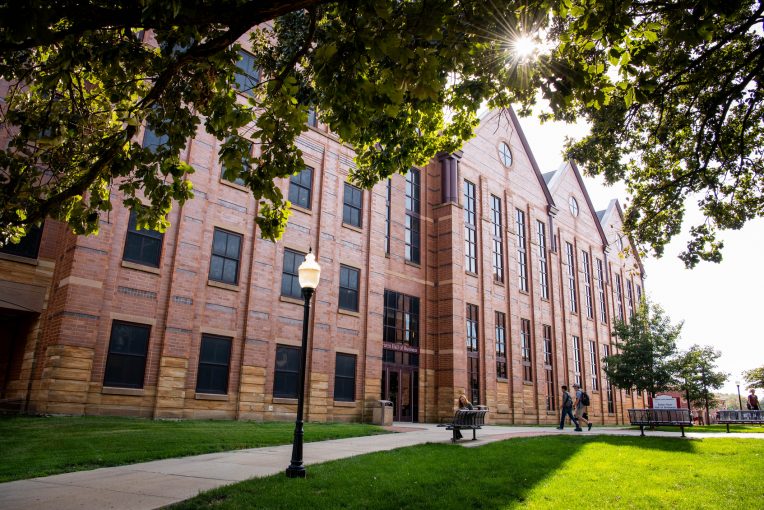The physical footprint of the College of Business Advising Center is growing—within the first-floor hub, it calls home in the State Farm Hall of Business. The office space is growing there, amid a sea of wall-to-wall technology kiosks.
But the real expansion is behind the scenes, according to Advising Center Coordinator Ginny Smith, a COB advisor for nearly a decade.
Most significant? The growing team of advisors, with a staff increase of about 60% just since 2019; paired with the shifting view that advising is a key component in the academic ecosystem.
With advisors now carrying manageable caseloads of about 375—nearly halved from just a few years ago—they’re able to dedicate more time to each business major, providing more personalized service, she said. In today’s environment, that’s an important piece of student success and retention.
“I’ve been in higher education almost 20 years now, and students have shifted. That’s not a bad thing, it just is an observation,” said Smith, adding the advisory role is a more time-intensive position now. Sometimes it means helping educate students about the difference among business sequences. Other times, it’s a matter of connecting them to the right campus resources. “So, you have to say, what are we going to do to meet the students where they are?” she said.
Historically, the College of Business already had some of the highest caseloads on the ISU campus. So, when the college saw 5% enrollment growth from 2014 to 2020, the team was stretched thin. At one point COB advisors carried nearly double the caseloads of the industry standard.
The National Academic Advising Association recommends an advisor-student ratio of no more than 350:1. Ditto for Association to Advance Collegiate Schools of Business (AACSB), the organization which accredits Schools of Business.
“When you’ve got nearly 700, you simply don’t have the time to spend with students that you want to. It’s just the math of it,” said Terry Noel, the College of Business Associate Dean for Academic Program and Curriculum. Since taking that post in 2019, he’s advocated for hiring more advising staff.
Budgetary constraints, plus a variety of other factors, including a talented team that could handle the heavy caseloads, kept delaying the hires, he said.
Noel credits ISU vice president and provost Aondover Tarhule for the final push, in a campus-wide prioritization of the university’s academic support system, said Noel.
“As often happens when someone from outside the campus comes in, it was just a fresh look at things,” he said. “Our provost is very analytical and very forward-thinking. He recognized immediately (the COB advisor-to-student ratio) was something that needed to be fixed,” said Noel.
Like Smith, Noel was thrilled to get news that the budget covered salaries for additional advisors this fall.
Since 2019, when Noel took his current post, he’s been incorporating his philosophy that advising has a role in guiding the college—in curriculum decisions, department-level discussions and more.
The advisors really are on the front lines with students, he said, and have a pulse on what’s happening. Advisors should be working closely with department chairpersons, and vice versa, he said. In some places, advisors are kind of shunted off. “There’s something happening, and people are vaguely aware there is advising going on,” he said. But, it’s never really interwoven into the college’s move forward.
That didn’t make sense to Noel. Often, it is advisors that have a handle on course enrollment levels, and which classes are popular among students, he said. Changes include adding Smith to the college’s curriculum committee.
“I wanted the advising unit to be integrated with this associate dean’s office. I picture the advisors as being a really valuable part of our delivering high quality education to students,” he said.
“With the added advisors, we feel like we’re well on the road to doing that,” he said.

